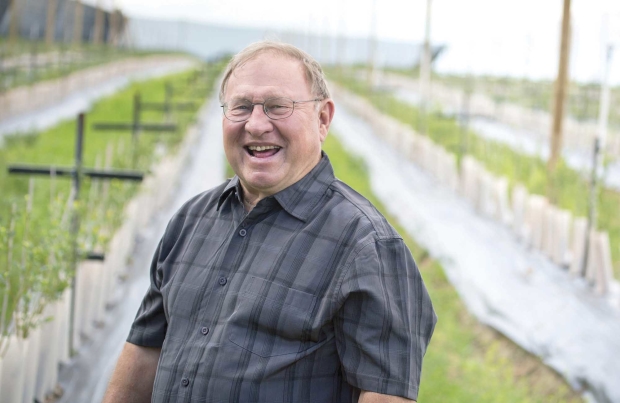
Richard Lehnert on a tour of orchards and blueberry fields in Naches, Washington in 2015. (TJ Mullinax/Good Fruit Grower)
Richard Lehnert was an old-style journalist, and proud of it. He could always sniff out a good story, was a stickler for facts, knew the background on everything, and could turn the driest of topics—from rootstocks to food safety—into scintillating prose.
But Richard, our associate editor for the past six years, wasn’t stuck in the past. He loved to write about new inventions that might make growers more successful and profitable.
The man who had hammered out his first stories on a manual typewriter now had the technological savvy to post his own articles online.
Each Monday, our Good Fruit Grower team of writers (Richard in Michigan, Melissa Hansen in Ellensburg, and myself in Wenatchee) would hold a video conference to discuss our progress on the upcoming issue of the magazine.
Richard, grinning from ear to ear, would reel off an unbelievably long list of stories he was already working on or hoped to tackle. His only frustration was that we didn’t have more pages to fill.
Online Tribute
Richard’s passing generated many heartfelt comments from the industry. View the post on our Facebook page.
Richard had a deep knowledge of farming. His parents, Evelyn and Edgar Lehnert, had a dairy farm at Sand Lake, Michigan, and his mother’s family grew apples on Fruit Ridge.
But if Richard hadn’t been a writer, he would have been a scientist. He started out majoring in chemistry at Michigan State University but switched to journalism, graduating in 1964 with a bachelor’s degree in journalism with a science writing specialty.
He worked as a laboratory assistant in horticulture and as an agricultural press release writer for MSU Information Services while in college.
It was there that he realized that agriculture could be based on science as well as tradition, and he decided to dedicate his career to writing about the scientific research and technologies that could improve farmers’ productivity and make their lives more rewarding.
He wished that other industries, such as automobile manufacturing or medicine, had followed a similar model by putting information into a palatable, easy-to-consume form.
After starting out in newspapers, Richard joined the staff of Michigan Farmer in 1965 and was promoted to editor. When the publication was sold in 1991 and all the staff terminated, he started his own communications agency.
In 2004, he was appointed managing editor of Fruit Growers News in Michigan. He and I would occasionally cover the same tree fruit events for our respective publications and became good friends. Though we were competitors, he would always greet me with a broad smile and a hearty handshake. I looked forward to reading his insightful reports and admired his ability to get to the core of the matter.
When he decided six years ago that he would rather telecommute than drive to work each day, we offered him the position of associate editor at Good Fruit Grower. He wasn’t a person to sit at home for long, though. He spent much of his time out interviewing growers, touring orchards, or visiting research facilities.
He thought nothing of driving to Chicago, Wisconsin, or Pennsylvania on assignments. And he traveled as far as Italy and Nova Scotia with his favorite group, the International Fruit Tree Association.
He was a joy to work with. I suspect he had strong opinions, but he rarely voiced them. I know of only two things that angered him: non-scientific opposition to GMOs and Donald Trump, both of which he found totally irrational.
During his 52-year career as a journalist, Richard earned many awards for his writing and photography, including being named Agriculture Writer of the Year by the American Agricultural Editors’ Association in 1975.
But the most special recognition came earlier this year when he received the Distinguished Service Award from MSU’s College of Agriculture and Natural Resources for his work informing farmers about scientific advancements made by agricultural scientists at the university. He believed it a huge honor to be recognized by his alma mater unprompted by an event such as retirement.
I believe Richard intended to work forever because that’s what he loved to do, besides tending to his own large garden, small orchard, and small herd of sheep.
And that’s how it worked out. He died suddenly in his sleep on August 31, the day before deadline, with all his stories already filed. He was 72.
Richard, you left us stunned and dismayed. We miss your wealth of knowledge, your sound judgment, your integrity, and your infectious enthusiasm for all things pertaining to tree fruit. But rest assured that, in the pages of the Good Fruit Grower and in the hearts of your family, friends, colleagues, and readers, your legacy lives on.






Leave A Comment